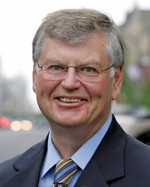Donald Trump is now President of the United States. He was sworn in at noon on Friday. He assumed the office despite having the lowest approval rating of any incoming president and losing the popular vote race by nearly 3 million.
Regardless, for the next four years he gets to run the US. What that means for cities, towns, states, Canada and other foreign nations is absolutely unknown. I am currently in the southern US researching and working on my upcoming book, and interviewing and talking with many community leaders and ordinary Americans.
There appear to be two primary emotions right now from people that I've talked to fear and uncertainty. And to be fair, there are people who are delighted with the new President and Congress.
Fear comes from the tweets, comments, proposed Cabinet appointments and the demeanour of the new Commander in Chief. Uncertainty comes from what he might do and the actions he might take and the comments he might make.
There is, however, also an attitude of give him a chance'. That, I suspect, is most people simply declaring their distaste for Washington politics and the old way of doing business in Congress. They are hoping for something different. Maybe better. It is a nation deeply divided. Rural/urban. Red/Blue. Wealthy/poor. There is little common ground, especially in the political centre.
I had an exclusive interview with Tampa Mayor Bob Buckhorn last week. He is leading Tampa in bold new directions and creating a thriving and prosperous local economy. His goal is to make Tampa the new economic leader for the Southeast United States, and with their port and airport thriving and the new CRINK economy leaders moving in and investing, Tampa is well on its way.
Mayor Buckhorn is very realistic about the new President and his relationship with cities. He does, however, believe that the promised infrastructure investments could be the common ground:
"You know, it is interesting. I'll preface this by saying I was a Hillary Clinton supporter. Neck-deep in the Clinton world. I think Mayors and cities can find common ground with President Trump over infrastructure if he lives up to what he said on the campaign trail. Being a builder, he gets the importance of infrastructure. How he structures these investments will be critical."
Mayor Buckhorn is realistic about the relationship between the new President and US Mayors. "For Mayors, be they Democrat or Republican, if Trump creates almost a Marshall Plan for infrastructure in the US and helps us to reinvest and rebuild, he'll find common ground. Not much else...but I think on that we can find common ground.
Like cities all across Canada, for metro regions in the US infrastructure remains the largest issue. If both federal governments commit to massive spending on roads, bridges, water systems and other necessities, it will help to rejuvenate cities and boost the North American economy.
"The US federal government for about the last 25 years has gotten away from largely assisting cities with major infrastructure projects—particularly water, sewer and bridges. They've been helpful on roads and rail. Helpful to some degree on ports and airports. But the nitty-gritty things that the federal government used to partner with us on have ceased to exist. And that's where you're seeing the decay. Tampa probably has eight water main breaks a day because I'm dealing with hundred year old infrastructure. Without that federal partnership we're basically just duct-taping things. We don't have the capacity financially to do significant investments to enhance the system and increase capacity," the mayor told me.
When I asked him about new infrastructure investments and pointed out what's happening in China and several other Asian nations, he instantly agreed. "I was in China recently to set up a sister-city with Lanzhou and I was astounded how much construction is taking place there, largely national government funded. They are making the infrastructure investments that we are not."
I then suggested that something like high-speed rail, and the fact that North America does not have one lousy mile of high-speed rail built, is a detriment to cities and our economic progress. Mayor Buckhorn agreed, and he was also remarkably blunt about the current political climate in America:
"High-speed rail is a perfect example. For Republicans, and particularly for Tea-party Republicans, they look at high-speed rail as some evil plot. They are so intent on shrinking the size of government and shrinking the federal government's role in our lives that they are doing it at the expense of our country's ability to move forward. There would never be a race to the moon in this current political environment because they would not be willing to invest in what would be required to get to that point. The same is true for cancer research, the same is true for any of these big, major global issues that take a national initiative and a national commitment to invest in and to sow those seeds...in this current political environment, in this Congress, you're on your own."
My thanks to Mayor Buckhorn. He was honest, articulate, thoughtful and constructive in his comments, as he and mayors across the USA tighten their seat-belts for what could be a rollicking and scary ride over the next four years.
Canadian mayors and cities will be watching with interest and apprehension.














